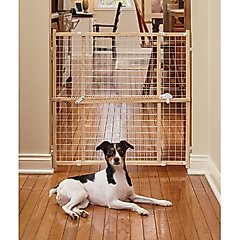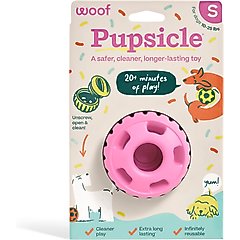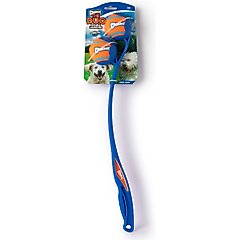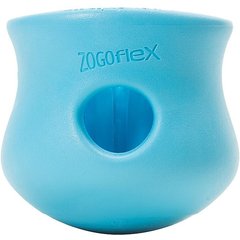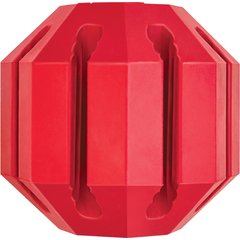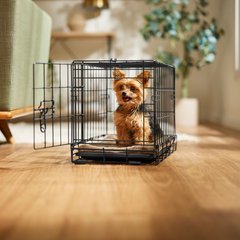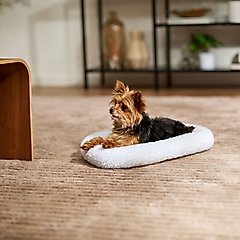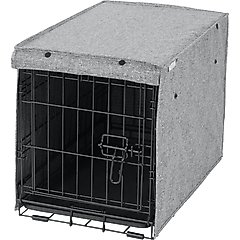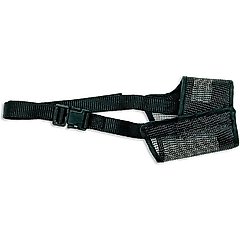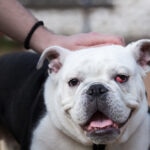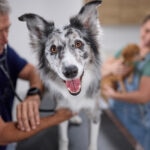What To Do if Your Dog Swallows an Object
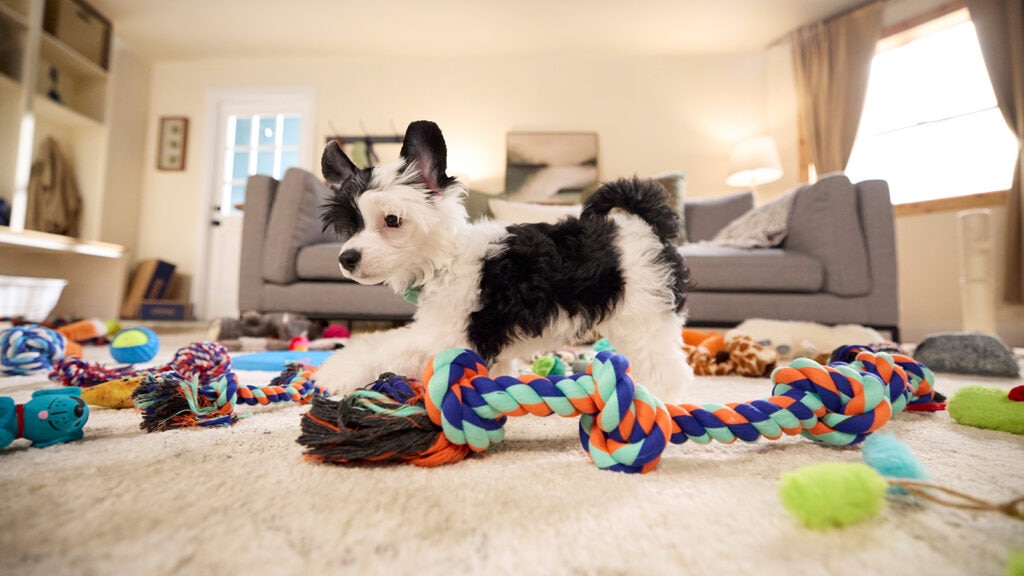
Photo by Chewy
Dogs love to keep you on your toes—and usually in the best of ways. Sometimes, though, they can get themselves into trouble, like when they accidentally swallow an object.
Veterinarians help us navigate exactly what to do if a dog swallows an object, be it a balloon, sock, part of a bone, or anything else they come across with a curious mouth.
If you think your dog swallowed something dangerous—like antifreeze, chocolate, medication, supplements, or rat poisons—call your veterinarian or the ASPCA Animal Poison Control at 888-426-4435 right away. And if your dog is struggling to breathe or showing serious symptoms, don’t wait—get to your vet immediately.
Key Takeaways
- Dogs, and especially puppies, discover the world through their mouths. This curious nature can lead to swallowing foreign objects they shouldn’t.
- It is best to err on the side of caution if your dog swallows a foreign object; in most cases, it is advisable to see a vet immediately.
- Dog-proofing your home, crating your pup, using a muzzle outdoors, and avoiding toys that turn into choking hazards can help prevent your dog from ingesting foreign objects.
Why Do Dogs Swallow Foreign Objects?
Dogs, and especially puppies, explore the world with their mouths. It’s sort of like a toddler getting into everything—they’re just curious and don’t understand the consequences of ingesting the wrong thing.
“During teething—usually 3–6 months old—that curiosity can turn into chewing and sometimes swallowing as it’s their way of learning about the world,” says Elliott Garber, DVM, veterinarian and founder of Creatures in Charlottesville, Virginia.
“Sometimes it’s simple boredom or anxiety, like when your dog gets into mischief while you’re at work,” Dr. Garber explains. “Other times, they’re drawn to something that smells interesting—like dirty socks.”
That said, if your dog is consistently raiding the laundry basket or eating rocks, it’s time for a checkup. This behavior deserves detective work to help figure out the underlying cause, which could be anything from anxiety to nutritional issues.
Common Foreign Objects Dogs Swallow and Their Risks
While this list isn’t exhaustive, these are some of the most common foreign objects dogs eat.
| Object | Risk | Emergency? |
|---|---|---|
| Socks, underwear | Intestinal blockage | Yes—see vet immediately |
| Chicken bones | Splintering, choking | Yes—especially cooked bones |
| Wood, sticks | Splintering, intestinal perforation | Yes—especially if your dog is pawing at their face or showing signs of discomfort |
| Sharp plastic | Intestinal perforation | Yes—see vet immediately |
| Corn cobs | Intestinal blockage | Yes—see vet immediately |
| Coins | Intestinal blockage, toxicity for pennies made after 1981 | Yes—see vet immediately |
| Fruit pits | Intestinal blockage | Yes—see vet immediately |
| Rocks, gravel | Intestinal blockage | Yes—see vet immediately |
| Strings, floss, thread, tinsel, hair ties, etc. | Intestinal damage, perforation, plication (intestines getting cinched together) | Yes—see vet immediately |
| Gum with xylitol (or any food with xylitol) | Low blood sugar and liver complications | Yes—see vet immediately |
| Plastic bags | Potential blockage depending on bag size | Yes—especially with vomiting, lack of appetite, and lethargy |
| Batteries | Toxicity, choking hazard | Yes—see vet immediately |
| Toy (whole or part), including balls | Choking hazard, intestinal blockage, and perforation | Yes—see vet immediately |
| Gorilla glue | Toxicity, intestinal blockage (it expands and hardens in the stomach) | Yes—see vet immediately |
The bottom line, Dr. Garber says, is this: “If something goes missing and your dog looks even slightly uncomfortable, please call the vet. We would much rather tell you everything’s fine than see you when it’s become an emergency.”
Signs Your Dog Swallowed a Foreign Object
So, how do I know if my dog has eaten something bad? There are a range of signs to look for, with some variation depending on the object eaten.
According to Sally Haddock, DVM, and board president for the North American Veterinary Community (NAVC) with headquarters in Orlando, Florida, here are some common signs your dog swallowed an object:
- Drooling
- Vomiting
- Decreased appetite
- Refusing treats
- Lethargy
- Abdominal pain/sensitivity (especially when you touch or press their tummy)
- Constipation
- Straining to poop
- Diarrhea
- Dehydration (dry gums, skin tenting)
- Whimpering/whining
- Hiding
- Prayer position (front end down, rear end up—signals abdominal pain)
- Pacing
Your dog may show only one or two of these signs, or many. Dr. Garber adds that in some cases, your dog may appear completely normal for several days until the object becomes more deeply embedded in their system.
That said, another key sign to look for is an item that has gone missing, or seeing them swallow or chew on an object.
What To Do if Your Dog Swallows an Object
Whether your dog ate something like a balloon, floss, or rocks, it’s essential to take it seriously.
Although something may seem like a small object in a large dog’s body, it can turn into quite an ordeal.
Here’s what to do if your dog swallows an object:
- Call the Pet Poison Helpline at 855-764-7661 (a fee applies) or ASPCA Animal Poison Control Center at 888-426-4435. “They will open up a case and give some specific treatment advice for the designated toxin for your veterinarian,” Dr. Haddock says.
- Head to the veterinarian immediately for assessment and treatment. They will do a complete examination and take the proper steps, such as taking X-rays, inducing vomiting, using an endoscope to remove the item, or performing surgery, and administering adequate protocol for specific toxins (never induce vomiting at home).
- Follow your veterinarian’s instructions. “After the foreign body in a dog has been dislodged and expelled, or if the pet is vomiting only fluid without producing a foreign body, an injection of an anti-vomiting medication and fluids [is] also administered,” Dr. Haddock says. Other cases may need different types of monitoring.
The sooner you can get your dog help, the better. Dr. Haddock says that the longer the foreign body remains in the intestines, the more damage it can cause, such as a perforation (a tear in the intestines).
How Can I Prevent My Dog From Eating Something They Shouldn’t?
Frantically entering in searches like “my dog has eaten plastic” or “what to do if a dog swallows a large item” is far from fun. Take these steps to prevent your dog from eating off-limit items.
1. Dog-Proof Your Home
Think of your home through your dog’s eyes. What looks like a fun toy?
“Secure those laundry hampers with tight-fitting lids, use covered trash cans, and keep kids’ toys up high,” Dr. Garber says. “For determined chewers, dog gates can be lifesavers.” Try the MidWest Wood/Wire Mesh Pet Gate.
Recommended Product
2. Give Them Lots of Exercise
A tired dog is often a good dog.
“Daily walks, puzzle feeders, and even five-minute training sessions work wonders for keeping curious mouths busy with appropriate activities,” Dr. Garber notes.
The Woof Party Pupsicle Treat Dispensing Dog Toy is highly rated, and the Chuckit! The Duo Double 22M Launcher Dog Toy will wear your pup out.
Recommended Products
3. Don’t Give Them Choking Hazard Toys
Use some discernment when picking dog toys—especially if your dogs are big chewers or have a history of swallowing items they shouldn’t.
“Choose sturdy rubber toys over plush ones that can be de-stuffed,” Dr. Garber suggests. Try the West Paw Zogoflex Toppl Tough Treat Dispensing Dog Chew Toy or the KONG Stuff a Ball Dog Toy.
Recommended Products
Also, avoid small balls that can be easily swallowed, as well as easily breakable items.
4. Crate Your Dog While You’re Away or Asleep
When you can’t supervise, Dr. Garber says that a dog crate or dog-proof room keeps everyone safe.
You can create a safe and welcoming space within a crate, like the Frisco Fold & Carry, by placing an extra-cozy dog bed, like the Frisco Quilted Dog Crate Mat, inside.
Recommended Products
Then, cover the crate with a crate cover, like the Frisco Faux Linen Dog Crate Cover that fits your crate exactly, or a used blanket that has your natural scent on it.
Recommended Product
For many, this is a safe space where your pup will enjoy spending time.
5. Muzzle Them Outdoors
If your pet likes to eat rocks or other items they come across outside, it’s imperative to keep a muzzle on them outdoors to help keep them safe, Dr. Haddock says. A good option is the Coastal Pet Products Best Fit Adjustable Mesh Dog Muzzle.
Recommended Product
She also says not to dump meat drippings on a gravel driveway, which may inspire your pup to feast on something they shouldn’t.
6. Let Your Vet Know if There’s a Pattern
If your dog has a habit of eating rocks, mulch, or other specific items, please notify your veterinarian.
“This isn’t just naughty behavior,” Dr. Garber says. “It could signal an underlying medical issue we can treat, making life better for everyone.”
FAQs About Dogs Swallowing Foreign Objects
My dog has eaten plastic. What do I do?
Head to the vet immediately, even if it is a small item. Even tiny items can create an intestinal blockage and/or perforation, which can threaten your dog’s life.
What foods can help a dog pass a foreign object?
If your dog swallows a larger object or a small one, you should go to the vet immediately. Your vet may recommend a “wait and see” approach, which could include eating foods high in fiber.
What happens if a dog eats a sock?
A sock can cause intestinal blockage in dogs, so go to the vet immediately. Your vet will perform a thorough exam, including an X-ray, to determine the location and may recommend removing the item using endoscopy under anesthesia or surgery.
What happens if a dog swallows a bone?
If your dog swallows a bone, it’s best to contact the Pet Poison Helpline at 855-764-7661 or ASPCA Animal Poison Control Center at 888-426-4435. They will advise you based on the situation and may recommend taking your pet to the vet.
My dog ate a balloon. What do I do?
Head to the vet immediately if your dog ate a balloon. This item can cause a dangerous intestinal blockage.
My dog ate floss. What do I do?
See your vet right away if your dog ate dental floss or any type of string. Issues such as cutting, perforations, pulling, or plication (a bunching effect) can occur, all of which are life-threatening.
What do I do if my puppy swallowed a foreign object?
Always contact the Pet Poison Helpline at 855-764-7661 or ASPCA Animal Poison Control Center at 888-426-4435 for advice and get to the veterinarian. It’s best to err on the side of caution.
